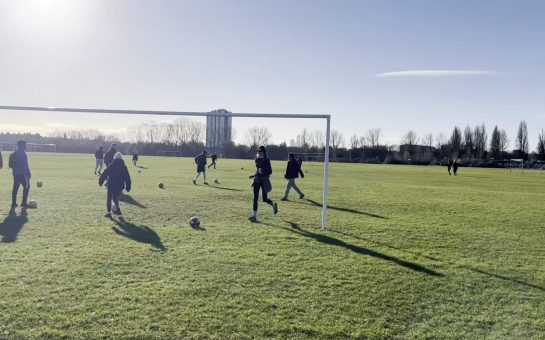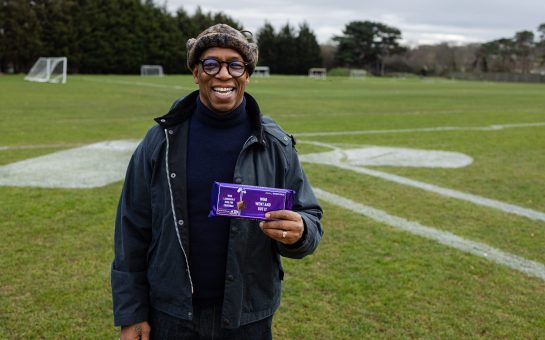Football banning orders (FBOs) are an “institutional prejudice against football fans”, according to a director of the West Ham United Supporters’ Trust (WHUST).
Chris Wheal claimed people think justice means a fair trial with a jury and legal representation, but none of that happens with football banning orders and nothing similar exists for other sports.
The comments came off the back of West Ham currently having 93 FBOs in place, the most amongst clubs in England and Wales, according to the latest Home Office data.
Wheal said: “The Supporters’ Trust believes in one law for everyone, with no special offences for football, no special policing of football fans and no special sentencing guidelines that punish the same offence differently because it occurs at football.
“We want a truly level playing field.”
Football banning orders prohibit individuals from attending football matches and last between three and ten years.
They are issued by courts in England and Wales for a football-related offence or after a complaint by a local police force, British Transport Police or the Crown Prosecution Service (CPS).
Six FBOs were issued to West Ham fans aged 50 and above in the 2023/24 season, whilst 18 have been issued in total since the 2018/19 season.
This puts the east London side five FBOs clear of fellow Premier League club Everton and Championship play-off finalists Sheffield United, who received 13 apiece over the same period.
Stratford-based West Ham was also one of just six clubs where a fan aged 65 or older received a FBO in the 2023/24 season.
The other clubs making up this select group are League One runners up Wrexham, National League club Tamworth, Championship play-off semi-finalists Coventry City, FA Cup semi-finalists Nottingham Forest, and League Two play-off finalists AFC Wimbledon.
The Met’s football policing lead, Chief Inspector Pete Dearden, previously told the North East Londoner West Ham have the worst record for FBOs in the country on the basis of having the most arrests.
However, he attributed this to the tolerance of the club.
He said: “It is a low threshold to be arrested.”
Arrest figures
Dearden added that the Hammer’s biggest rivals, Millwall, still probably pose the biggest challenge.
He said: “Risk group activity really now in London is really a Millwall centric issue.”
Looking at arrest numbers compared to the average number of home fans attending league games, this appears to be the case.
Across the 2023/24 season, 103 West Ham fans were arrested, compared to 47 Millwall supporters, but the London Stadium had an average attendance of 59,440 home fans, compared to 14,638 per league game at The Den.
This means that despite having four times as many home fans attending league games, the Hammers had only double the number of arrests.
Bermondsey-based Millwall also have 82 FBOs currently in force, the third-most across all football clubs in England and Wales.
Wheal said: “It doesn’t take an Einstein to work out that Millwall having 82 with its small supporter base is far worse than West Ham’s 93.”
However, north London side Tottenham Hotspur had a similar home attendance to West Ham but just over half the amount of arrests.
Wheal added there was no context given by the Home Office for football-related arrests pertaining to individual clubs, although the statistics include the football-related arrest rate per 100,000 attendees by competition.
He said: “Elsewhere, the police do provide balance.
“They put the number of arrests in the context of the number of people who go to watch football.
“It is perfectly possible there were many more clubs with a worse arrest rate than West Ham if the police put the numbers in context per 100,000 fans.”
London’s top 10
Taking a wider view of London clubs, banning orders have increased significantly post-Covid.
Amongst the top 10 London clubs based on the current number of FBOs in force, only west London club Queens Park Rangers has decreased its number of banning orders since 2019, from 20 to 19.
In the same period, Wimbledon, Spurs, and Crystal Palace saw increases of 166%, 141% and 122% respectively, whilst Millwall, Arsenal and West Ham have seen respective rises of 90%, 88% and 72%.
Dearden said there’s going to be an artificial increase because they are now capturing and recording the data.
He added: “But in terms of violence, I think it’s fair to say that post-Covid, there has been an increase, albeit far more frequent, lower-level issues.”
According to Damian Wall, head of Reeds Solicitors’ football offence team, three or four years ago it was rare for someone to face a football banning order unless it was for serious disorder.
However, he said is currently working on a case where two sets of fans at a ground in the North West charged with a very low level public order matter, and the police are trying to get FBO’s for all four of them.
He added: “Now it seems to me that any sort of trivial incident could result in prosecution, and in most cases where there is a football-related offence, the police are automatically applying for a football banning order.
“That’s my experience over the last 12 to 18 months.”
Wheal said: “The Met Police love football banning orders.
“West Ham’s designated football officer, PC Andy Sheldon, briefs on how much easier it is to get a conviction for a football banning order.
“There is a lower burden of proof and the accused is not entitled to legal aid, so most do not have any legal representation.”
The Met declined to comment.
Law changes
Last year, the Met claimed to have secured its largest-ever amount of FBOs in a single season.
Of those, 52 bans were issued for public order offences, including eight for tragedy chanting and another eight for racially aggravated public order offences, according to the force.
In addition, 51 three-year banning orders were issued to fans found with Class A drugs.
According to Wall, cases in the past year have been split between public order offences in or around the ground, and possession offences going into the ground.
However, Wall, whose cases include a Fulham fan being detained for possession whilst attending a Manchester United game, said that possession offences are all away fans visiting other grounds.
He added: “Drawing a conclusion from the people I’ve spoken to, to be prosecuted for drugs at a home match, you’d probably have to be arrested for something else, such as being drunk in the ground or causing a disturbance, and then searched because you wouldn’t necessarily come into contact with a drug sniffer dog.”
Sniffer dogs are used by police to sniff out fans in possession of cocaine, and according to Wall, they are used solely for away fans, presumably because of the police’s limited resources.
The National Police Chief’s Council was contacted for comment regarding the use of sniffer dogs at games.
Police have only been able to apply for FBOs following a conviction for possession of cocaine at football matches, or while entering or attempting to enter football grounds, since the law was changed in November 2022.
According to Wall, this change has contributed substantially to the rise in FBOs.
He said: “If you’re stopped in the street or on the way into a nightclub with some cocaine, you probably wouldn’t be arrested or go to court.
“You’d probably be given a fixed penalty notice or a caution and have the drugs taken off you.
“If you’re caught with the same amount going into a football ground, you’re charged with possession and have to go to court for a possession offence.
“As well as facing a conviction and sentence for a drug offence, although the sentence is likely to be nominal, you’re facing the prospect of a three-year banning order preventing you from attending any football matches in the UK or Europe.”





Join the discussion